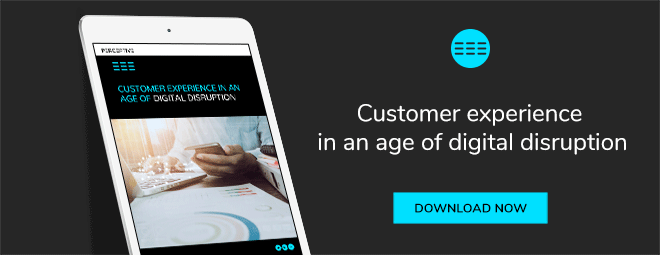To achieve outstanding results for your business, you have to deliver outstanding customer experiences.
In our dynamic and digitally savvy marketplace, where customers are demanding and expecting more, the customer experience (CX) and customer journey are intertwined. Moreover, they often start digitally. Today, customers expect exceptional and nothing less, so that’s what what you need to deliver. So here are 10 principles to keep top of mind during your customer experience transformation.

Read more: The Future of Business: data and digital transformation
1. Consistency is crucial
Crucially, what is needed is for the customer to experience consistency across all touch points, whether that’s your products or interacting with your business as a whole.
In order to achieve consistency, you should unite your customer information and break down customer data silos. No only will this provide a single source of truth when it comes to your customer data, it will also facilitate smarter decision making for your executive team, who will gain a clearer picture of who their customers are. The more holistic the view of your data, the smarter and more evidence based your organisation's decisions will be.
2. Culture before strategy
You may have heard the saying “culture eats strategy for lunch”. This to say that culture plays a key role in achieving CX success; it’s effectively how you get all the different elements synched up.
You aim should be to create sustainable culture that is focused on the customer at all times. Think of it this way: the worst thing that can happen to your business is having employees who think they're already providing superb customer experiences. Many employees might think they go above and beyond but often their customers don’t agree. However, it’s not easy to enforce a mind-set shift. The solution is to focus on the impact of CX on your customers and on your business performance as a whole and highlight how each employee's role directly affects the customer experience. Remember, culture is all about what your organisation believes, thinks and does. Communicate this clearly and believe it passionately.
3. Know why you're focusing on customer experience
What's your financial driver? What financial gain are you missing out on by not improving the customer experience? You will need to think about CX as a value proposition. Once you think in financial terms, this changes the conversation entirely.
4. Create a vision that gets people excited
This goes for you customers as well as your employees. CX isn't customer service, it's about delivering extraordinary customers experiences at every touchpoint. Therefore, you want to get your employees to buy in to a vision that everyone want to be a part of, and clearly communicative all of the opportunities that this transformation will bring.
5. Metrics rule
Develop metrics that people share responsibility and accountability for and that are clearly connected to customer-related KPIs. Develop accountability processes so that people are held to account. Siloed metrics achieves nothing as they won’t be accountable to the customer measures.
6. Integrate customer experience with other initiatives
The only way for customer experience (CX) to be successful in your business is if it doesn’t compete with other initiatives like customer engagement, leadership, and innovation. Your CX complements them, and the key is to find the elements that link them all together. Your final objective will be to create a stronger organisation as an end result, therefore these elements will all need to work in unison.
7. Use your CEO as your biggest asset
Your CEO needs to be involved every step of the way. They are the only one who can break down any existing silos and approve any needed budget to enforce real transformation. Getting their buy-in early is critical.
8. People ahead of products
The truth is that what makes a business or any experience unique are human interactions. This is what will make your business stand out. Products can too easily be copied, and only real people can truly exceed customers' expectations to surprise and delight. Therefore, you need to put your people and the interactions they have with your customers, ahead of anything else.
9. Everyone’s in charge
Again, it’s about everyone in the organisation being accountable. That’s how things get done, and that’s how CX will become a priority. Let every employee have a part in the customer experience. Appoint CX leaders who provide the training and tools needed to empower employees to deliver amazing customer experiences.
10. Develop a long term plan for CX
Unless your CX initiative is going to be a sporadic occurrence, you need a long-term plan to ensures CX will be adopted across your business. Develop a comprehensive long-term plan where you pinpoint the existing skill set in the organisation. Your aim should be to develop those skills in other members of the team and appoint representatives to maintain the momentum of CX.
Learn more about how your business can succeed through digital disruption with our free Customer experience in an age of digital disruption ebook!
